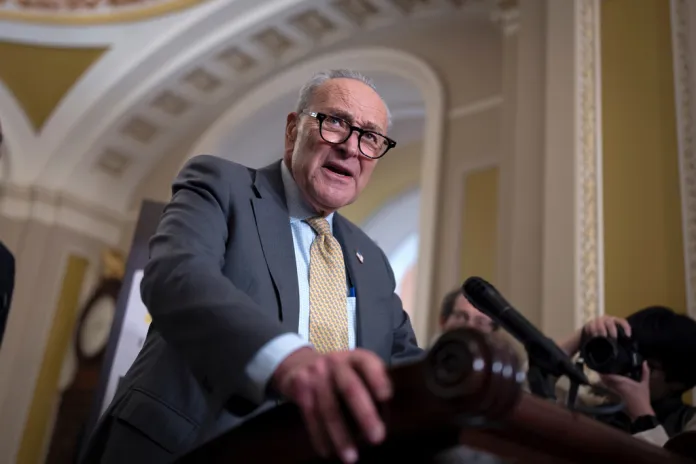Senate Democrats aren’t ruling out bipartisan progress on full-year spending bills as Republicans make Pentagon funding the new pressure point in a weekslong shutdown fight.
A Thursday vote on the War Department funding bill, teed up by Senate Majority Leader John Thune (R-SD), is presenting Democrats with their latest unity test. They have largely stuck together to oppose a short-term spending patch that passed the House in September, instead demanding that healthcare concessions be part of any funding bill.
But there is an appetite, particularly among Democratic appropriators, to move the Pentagon money alongside several other bills that have yet to receive a floor vote. The Senate passed three of the 12 annual appropriations bills Congress is supposed to consider each year, but further negotiations have stalled in the face of shutdown gridlock.
Top Democrats were noncommittal on the eve of the procedural vote, citing a lack of clarity on which other spending measures would hitch a ride on what is known as a minibus, but they notably did not reject progress on the legislation outright.
“We have to see what [Republicans are] going to put on the floor,” Senate Minority Leader Chuck Schumer (D-NY) said. “They haven’t told us yet.”
The Pentagon measure will require 60 votes and support from at least seven Democrats to clear its first Senate hurdle. But even if Republicans can muster the votes, the bill is not expected to be the silver bullet that ends the shutdown.
On Wednesday, Thune said he does not see passing full-year bills, a cumbersome process that could take weeks or months, as the off-ramp, instead viewing the House-passed funding patch, which failed for the ninth time on the Senate floor Wednesday with limited Democratic support, as a way to reopen the government and buy Congress more time.
More importantly, the process is not entirely in the control of leadership. Even if Schumer buys in and supports a minibus, a single senator can object to bundling bills together and derail that progress.
The move by Thune puts Democrats at a difficult political crossroads. Voting to proceed on Thursday could weaken their shutdown leverage over healthcare concessions, namely their demand that Republicans extend premium Obamacare subsidies that expire at the end of the year.
But opposing defense spending, including the troop pay authorized by the legislation, would create bad optics and the latest attack line for Republicans to paint their liberal colleagues as obstructionists.
“We’ll find out [Thursday] whether the Democrats want to proceed to the defense appropriations bill and what other bills we might [be] able to attach to it — if we can get consent to do it,” Thune said.

Several rank-and-file Democrats said they were “open” to jump-starting the appropriations process on Wednesday, depending on which bills were attached to the Pentagon spending measure. Sen. Angus King (I-ME), one of three senators to cross party lines and back the GOP’s short-term funding bill, said he would vote to move forward if it’s paired with funding for the Labor Department and Health and Human Services.
Sen. Susan Collins (R-ME), the Senate’s top appropriator, has named the Labor-HHS funding, plus two other spending bills, as priorities for a funding package.
Sens. Gary Peters (D-MI) and Jeanne Shaheen (D-NH), both retiring next year, also told the Washington Examiner they were willing to consider moving full-year spending bills during the shutdown, though they declined to get specific.
“I’m open to hearing what they have to say,” Peters said.
Sen. Cory Booker (D-NJ), a member of Democratic leadership, appeared less inclined to support any long-term funding measures unless the Obamacare subsidies were addressed first.
“The major focus right now is solving this healthcare crisis,” Booker told the Washington Examiner. “I know there’s a lot of discussion on other things, but I feel very firmly that we need to keep the focus on the American people and defending them against these massive losses of health insurance.”
Separate from the Pentagon vote, Thune is laying the groundwork to begin negotiations with the House on a three-bill minibus passed by the Senate earlier this year. There have already been informal talks between appropriators in both chambers, but a vote to go to “conference” is expected before final legislation can be hammered out and sent to President Donald Trump.
Even before the shutdown gripped Washington, there were mounting Democratic complaints that Trump would undermine any government funding deals struck by Congress with his use of pocket rescissions, aimed at canceling spending unilaterally at the end of a fiscal year.
THUNE TEES UP DEMOCRATS’ NEXT SHUTDOWN TEST WITH PENTAGON FUNDING VOTE
Sen. Lisa Murkowski (R-AK), an Appropriations Committee member, blamed White House budget chief Russ Vought, accusing him of eroding trust with Democrats by clawing back the previously approved money.
“If you’re a Democrat, you’re looking at it and you’re saying, ‘Why am I going to try and be helpful if Mr. Vought and OMB are just going to do a backdoor move and rescind what we’ve been working on?’” Murkowski told reporters. “Yeah, there’s a lack of trust. Does it make it harder to come to terms on hard things like a government shutdown? Absolutely.”























